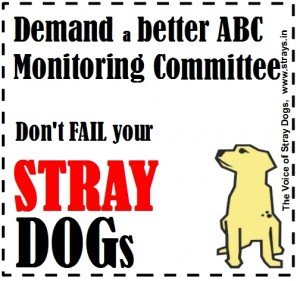 One of the best ways to ensure that stray dogs are treated in the manner prescribed by Indian laws, is to have effective monitoring of the ABC program. The problem always has been the opacity of the process of monitoring which is seen as the elitist preserve of bureaucrats, government officials and AWO’s running ABC programs etc. This changed through the amendment of the ABC rules, essentially allowing individuals and organizations engaged in animal welfare to participate and make it more effective. Steps you should take immediately in your city:
One of the best ways to ensure that stray dogs are treated in the manner prescribed by Indian laws, is to have effective monitoring of the ABC program. The problem always has been the opacity of the process of monitoring which is seen as the elitist preserve of bureaucrats, government officials and AWO’s running ABC programs etc. This changed through the amendment of the ABC rules, essentially allowing individuals and organizations engaged in animal welfare to participate and make it more effective. Steps you should take immediately in your city:
- Since the Municipal Commissioner is supposed to be the Chairman of the Municipal Committee as per the ABC (Dogs) Rules, 2001, you need to approach him for the formation/reconstitution of the committee wrt the information set out above.
- Demand participation in the Monitoring Committee – since a representative of the people can now validly be on the Committee.
- Work towards having your representation on the Committee.
- Demand monthly meetings & transparency in functioning.
- Demand that the meetings and the update of the committee be made public
Detailed note on amendment to ANIMAL BIRTH CONTROL DOGS RULES, 2001
Notification SO 303(e) 8th Feb 2011 published on 31 March 2010 amended the Animal Birth Control (Dogs) Rules, 2001 rule concerning constitution and operation of monitoring committees. The amendments/addendum is indicated in red in the text below. What it implied for animal welfare organizations and people is that it is required that (a) the monitoring committee have one of you in your city on the committee & (b) the activity of the committee be made public << The text of the amendment notification of formation of monitoring committees under ABC Rule (2001) can be seen here >>
R.4 Formation of Committee: Formation of Committeea monitoring committee consisting of the following persons shall be constituted by the local authority for a period of three (3) years, namely(a) Commissioner/Chief of the local authority, who shall be the ex-officio Chairman of the Committee;(b) a representative of the Public Health Department of the local authority;(c) a representative of the Animal Welfare Department if any of the local authority; (d) a veterinary doctor; (e) a representative of the district Society for Prevention of Cruelty to Animals (SPCA); (f) at least two representatives from the Animal Welfare Organisations operating within the said local authority; (g) a representative of the people who is a humanitarian or a well known individual who has experience in animal welfare in the locality“
R.5 Functions of the Committee: The committee constituted under rule 4 shall beresponsible for planning and management of dog control programme in accordancewith these rules. The committee may:(a) issue instructions for catching, transportation, sheltering, sterilisation,vaccination, treatment and release of sterilized vaccinated or treated dogs.(b) authorize veterinary doctor to decide on case to case basis the need to put to sleep critically ill or fatally injured or rabid dogs in a painless method by using sodium pentathol. Any other method is strictly prohibited.(c) create public awareness, solicit co-operation and funding. (d) provide guidelines to pet dog owners and commercial breeders from time totime.(e) get a survey done of the number of street dogs by an independent agency.(f) take such steps for monitoring the dog bite cases to ascertain the reasons of dog bite, the area where it took place and whether it was from a stray or a petdog.(g) Keep a watch on the national and international development in the field ofresearch pertaining to street dogs’ control and management, development ofvaccines and cost effective methods of sterilization, vaccination, etc. (h) the activities of the Committee shall be brought to the public notice bu announcements and advertisements
R.6. Obligations of the local authority: (1) The local authority shall provide for(a) establishment of a sufficient number of dogs pounds including animalkennels/shelters which may be managed by animal welfareorganizations;(b) requisite number of dog vans with ramps for the capture andtransportation of street dogs;(c) one driver and two trained dog catchers to be provided for each dogvan;(d) an ambulance cum clinical van to be provided as mobile center forsterilisation and immunization;(e) incinerators to be installed by the local authority for disposal ofcarcasses.(f) periodic repair of shelter or pound.(2) If the Municipal Corporation or the local authority thinks it expedient tocontrol street dog population, it shall be incumbent upon them to sterilize andimmunize street Dogs with the participation of animal welfare organizations,private individuals and the local authority. (3) The animal welfare organizations shall be reimbursed the expenses ofsterilization/immunization at a rate to be fixed by the Committee onfortnightly basis based on the number of sterilization/ immunization done. (4) The monitoring committee of the said locality shall meet at least once in every months to assess the progress made in regard to the implementation of the Animal Birth Control programme.
All individuals and organizations should therefore note that:
- The tenure of every monitoring committee can only 3 years
- The Monitoring Committee will have to include “a representative of the people who is a humanitarian or a well known individual who has experience in animal welfare in the locality”
- The Monitoring Committee of the locality will have to meet once every month, to assess progress made with regard to implementation of the ABC program
- The activities of the Monitoring Committee shall have to be brought to public notice by advertisements and announcements.
Demand an effective Monitoring Committee for ABC programs in your city





